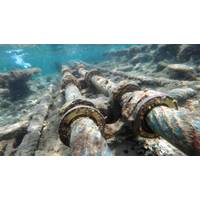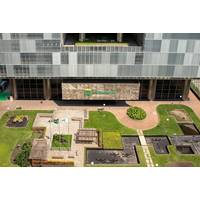Port Battle Underscores Possible Libya Break-Up
Armed factions deploying heavy weapons. Peace talks making little progress.
Hidden behind a pile of sand, a tank points its gun towards Libya's biggest oil port on the other side of an invisible frontier that now divides the north African nation.
Factions fighting for control of Libya and its oil wealth have moved columns of heavy weapons to this new front line running through the middle of the country, escalating a conflict that Western powers fear may lead to a national break-up four years after the overthrow of Muammar Gaddafi.
In an attempt to prevent Libya from sliding into all-out civil war, the United Nations hopes in the coming days to resume peace negotiations between the warring parties, which are allied to rival governments running what amount to competing states in the west and east of the country. Talks so far have made little progress.
The battle over the Es Sider oil port, 700 km (450 miles) east of Tripoli, shows how hard it will be to overcome mutual suspicion and rivalry in a country dominated by armed militia groups whose allegiances are largely local.
Both sides facing each other near the town of Ben Jawad across a front line littered with tank shells and bomb craters are made up of former rebels who fought together to oust Gaddafi but are now fighting each other over who owns the 2011 uprising.
"Thank God there is a dialogue. But they say they support the dialogue and then bomb us with war planes," said Mussab Bala, a commander in Operation Shorouq, a faction allied to the self-proclaimed Tripoli government which has been trying to seize Es Sider and the nearby Ras Lanuf port from the internationally recognised government in the east.
"They target civilian facilities," Bala said, standing by a car he says was bombed by a warplane from the eastern government. A workshop and a bank were also hit in the raid on Ben Jawad, whose residents have now fled.
For its part, Shorouq was accused by the United Nations of violating a ceasefire announced last month by launching a new attack this week. The official government says the force also fired rockets into oil storage tanks at Es Sider, charges Shorouq denies.
Soldiers on both sides report to rival army chiefs of staff and have the unshakeable conviction that their fight is just.
They wear the same Libyan army uniforms and drive the same Toyota pickups that bear the insignia of a force supposed to protect the oil ports they are fighting over. It is becoming an expensive battle, with Libya's oil production now just one fifth of what it was under Gaddafi and both Es Sider and Ras Lanuf closed. The United Nations says hundreds of civilians have been killed across Libya in fighting since last summer.
NEW, OLD BORDER
In the east of the country, the recognised government of premier Abdullah al-Thinni and the elected House of Representatives have allied themselves with General Khalifa Haftar, a Gaddafi-era officer who now commands his own troops and air force.
The politicians were forced to flee when a faction called Libya Dawn, to which Shorouq is allied, seized Tripoli in August, reinstating the old parliament and setting up an alternative administration. Neither side has managed to gain the upper hand militarily.
Shorouq comes from Misrata, a western city that is home to some of the most battle-hardened troops from the 2011 uprising.
They moved east in December, trying to take Es Sider using old Gaddafi-era tanks and Toyota trucks, some of which are so new that they still have customs stickers on the roof.
But while Mussab and his men can see the outskirts of Es Sider, General Haftar's air force has stopped any further advance. Whenever they move forward a warplane takes off from Ras Lanuf and bombs them.
"If it wasn't for the planes, we would have finished them," said Fadi, another fighter from Misrata. "But we will liberate the ports."
The conflict pits communities from the western coast against tribes in the east and hinterland. It has effectively reinstated the historic border between Tripolitania and Cyrenaica, two regions from the Italian colonial era which merged with Fezzan in the south when Libya became independent after World War Two.
The new front line has cut the Tripoli to Benghazi coast road in half. Two sand berms block cars and commercial vehicles east of Ben Jawad.
In the east of the country, long neglected by Gaddafi, calls for a federal state or even secession are popular. Ibrahim Jathran, commander of a militia force holding Es Sider, backs an independent Cyrenaica should Tripoli's new rulers win recognition.
"We are against partition. We want one Libya," said Bala, drawing a map of Libya in the sand with a heart in the middle. "But these groups want to take the oil for Cyrenaica."
One challenge for mediators is that so many factions are involved in the fighting. A university in Misrata temporarily closed to allow students to join up while firms also give staff time off. In the eastern city of Benghazi young men have joined Haftar's forces fighting a separate battle against Islamist troops that has claimed hundreds of lives.
"I am an engineer at the (Misrata) steel firm. I came to serve my country," said Ramadan, a Shorouq trooper, in Ben Jawad.
At the front, the fighters rest under a solar panel near their anti-aircraft guns. Further back, Ramadan and his comrades are taking a break in a house, sitting on pillows, guns stacked next to water bottles and boxes of new army kit.
In the ghost town of Ben Jawad, men from Misrata prepare a meal of couscous in a government office. "We will continue until the liberation," said an administrator, while his staff packed lunch boxes to be sent to the front.
By Ulf Laessing






